Super Bowl Script Cavalcade: The Wonder Years
On the surface, the Super Bowl might seem to be about football and over-the-top commercials, but anyone who's anyone knows that it's really about the episode of television that airs immediately following the game. TV networks have historically used the massive viewership that accompanies the most-watched event of the year in order to cultivate a greater audience for one of their new or currently running shows. This is the cultural phenomenon known as the "Super Bowl Lead-Out Program." This time slot has seen everything from Lassie after the very first Super Bowl in 1967 to Julia Roberts guest-starring on Friends to a man with an active bomb stuck in his body on Grey's Anatomy to what's sure to be a heart-palpitation-inducing episode of This Is Us immediately after the New England Patriots take on the Philadelphia Eagles this Sunday.
Studying scripts from past post-Super Bowl lead-out episodes can be a particularly illuminating experience for writers. Such scripts are littered with tactics for hooking viewers—viewers whose senses have probably been dulled by too many flashy commercials or perhaps by too much beer.
For the past 25 years or so, the trend among networks has been to air a special, high-budget episode of an already wildly successful show, but this hasn't always been the case. From the mid 1980s to the mid 90s, networks hoped to jump-start the audience for new shows by airing pilots after the super bowl. This tactic didn't work especially well as many of these series were cancelled sometimes within weeks of their initial debut.
On many counts, one of the most successful pilots to air after the Super Bowl was the pilot for The Wonder Years, which premiered on ABC immediately after Super Bowl XXII in 1988, exactly thirty years ago this year.
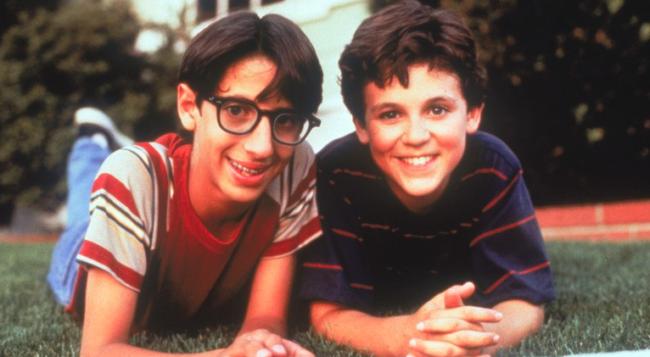
Written by Neal Marlens & Carol Black (The team behind Growing Pains and Ellen), the pilot for The Wonder Years has little in common with the huge guest stars or heart-rending plot machinations of post-Super Bowl TV episodes in more recent years. Rather, it's subtle and uses nostalgia to look at the everyday upbringing of its 12-year-old protagonist. On the surface, it doesn't seem like the type of program that people would double over in desperation to tune into, yet in its debut and in subsequent seasons, The Wonder Years managed to accrue a passionate and dedicated viewer base.
The question is: how does a small, sentimental show without obvious high stakes or attention-grabbing trappings come to garner such a loyal following and become known as a television classic?
The pilot script opens, as nearly every episode of the show does, with an adult man named Kevin Arnold looking back on his adolescence in the 1960s.
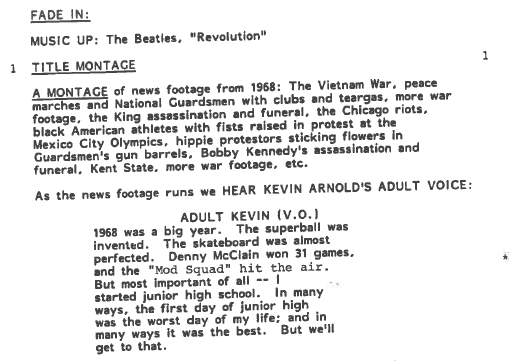
Notice how one of the first scenes is a group of kids playing football in the street.
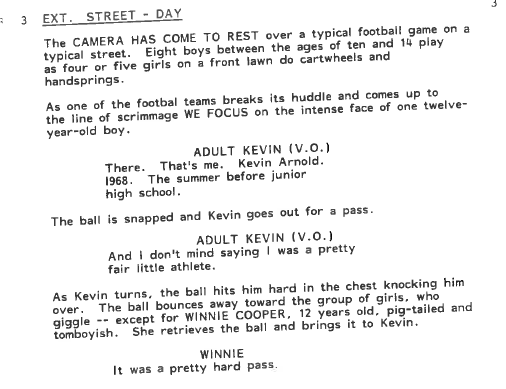
In 1988, this is the perfect sentiment to evoke amongst people watching the biggest football game of the year because they might be watching it with family and/or friends and reminiscing. Part of how The Wonder Years draws people in is by crafting a deeply personal narrative around themes and experiences that everybody has dealt with to a certain extent.
It tells stories about family and misunderstandings between parents and their kids:
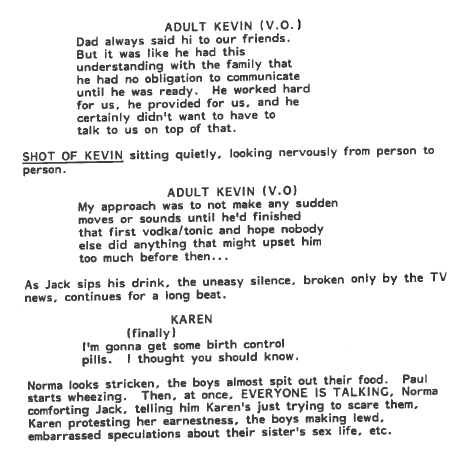
It deals with friendship in a really warm and empathetic way:
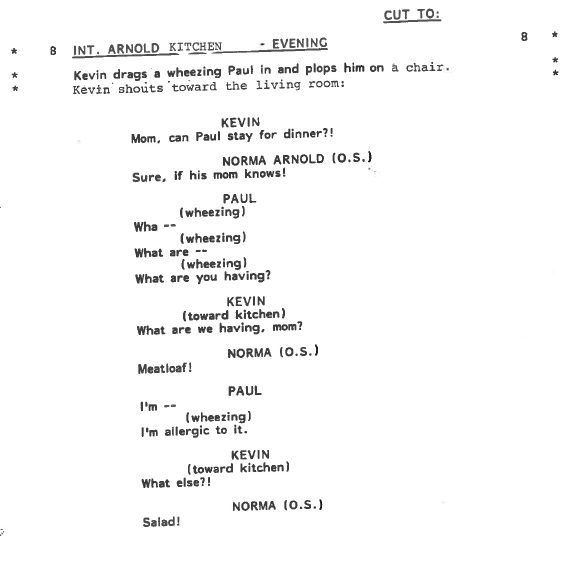
It deals with first love:
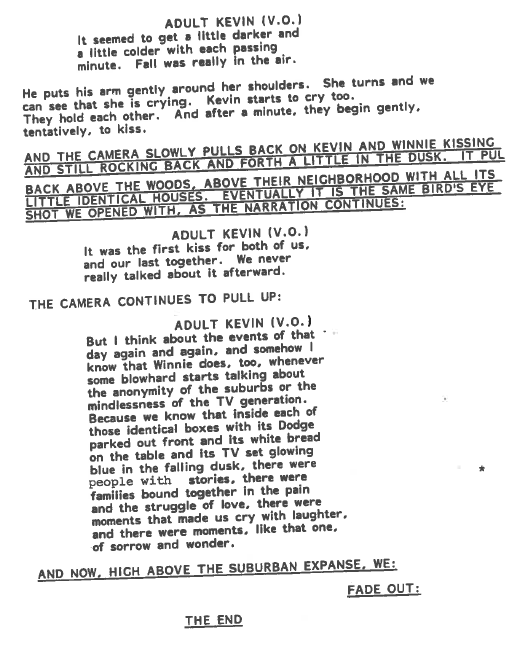
The show even deals also death. In fact, none of the aforementioned topics go un-broached even in the pilot script.
By 1988, the boomer generation was mostly grown up and probably living in suburbia with children of their own. Most of them probably tuned into the Super Bowl that year. The Wonder Years attempts to speak directly to them by telling stories about events they would have very acute, personal memories of, such as the war in Vietnam or MLK Jr. and JFK's assassinations. By writing specifically about these things, the writers fashion a show that people can feel belongs to them. They take this feeling of personalization one step further by wrapping their stories in the music of the time period. Nothing can "take a person back" like hearing songs from a certain era, so the feeling of nostalgia is multiplied many times over by including popular songs from the '60s.
Literary wisdom tells us that "the personal is universal." By delving down into the specifics of what it was like to grow-up during the 1960s, the writers here create a story that feels poignant for anybody who's ever grown-up. That's their hook. That's why their show matters to so many people.
Maybe the pilot for The Wonder Years is an exception and not the rule when it comes to Post-Super Bowl Lead-Out programming, but it deserves to be a case study in how it allows anybody regardless of the circumstances or time period of their upbringing to be able to look back on their youth from a distance and imbue certain people and events with deeper meaning and understanding. Isn't that what storytelling is all about?
If you want to study-up on Post-Super Bowl Lead-Out episodes, get your fix in the WGF Library’s collections. We have the following:
- The A*Team's "Children of Jamestown" - Written by Stephen J. Cannnell, which aired in 1983 after Super Bowl XVII
- The pilot episode "Gone for Goode" from Homicide: Life on the Street - Written by Paul Attanasio, which aired in 1993 after Super Bowl XXVII
- Friends’ “The One After the Superbowl,” (Pt. 1 Written by Jeffrey Astrof & Mike Sikowitz; Pt. 2 - Written by Michael Borkow), which aired in 1996 after Super Bowl XXX
- The X Files’ “Leonard Betts" - Written by Vince Gilligan & John Shiban & Frank Spotnitz, which aired in 1997 after Super Bowl XXXI
- The pilot for Family Guy - Written by Seth MacFarlane, which aired in 1999 after Super Bowl XXXIII
- Malcolm in the Middle’s “Company Picnic" - Teleplay by Al Higgins, which aired in 2002 after Super Bowl XXXVI
- Grey’s Anatomy’s “It’s the End of the World,” which aired in 2006 after Super Bowl XL (and it’s equally incredible follow-up episode “As We Know It” which aired a few days later, both written by Shonda Rhimes)
- House’s “Frozen” - Written by Liz Friedman, which aired in 2008 after Super Bowl XLII.
- Elementary’s “The Deductionist” - Written by Craig Sweeny & Robert Doherty, which aired in 2013 after Super Bowl XLVII
As always, continue to search our library catalog for all your script reading needs.
